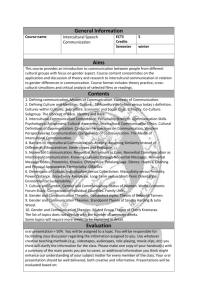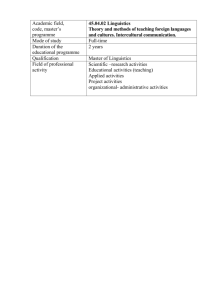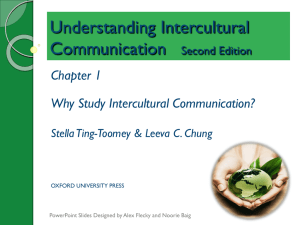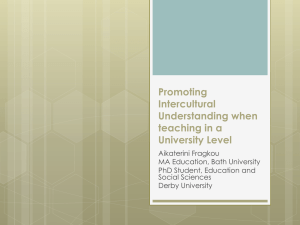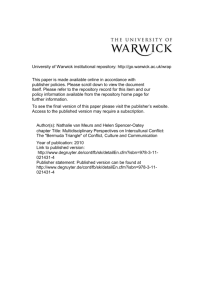Talking Cultures: Exploring Intercultural
advertisement
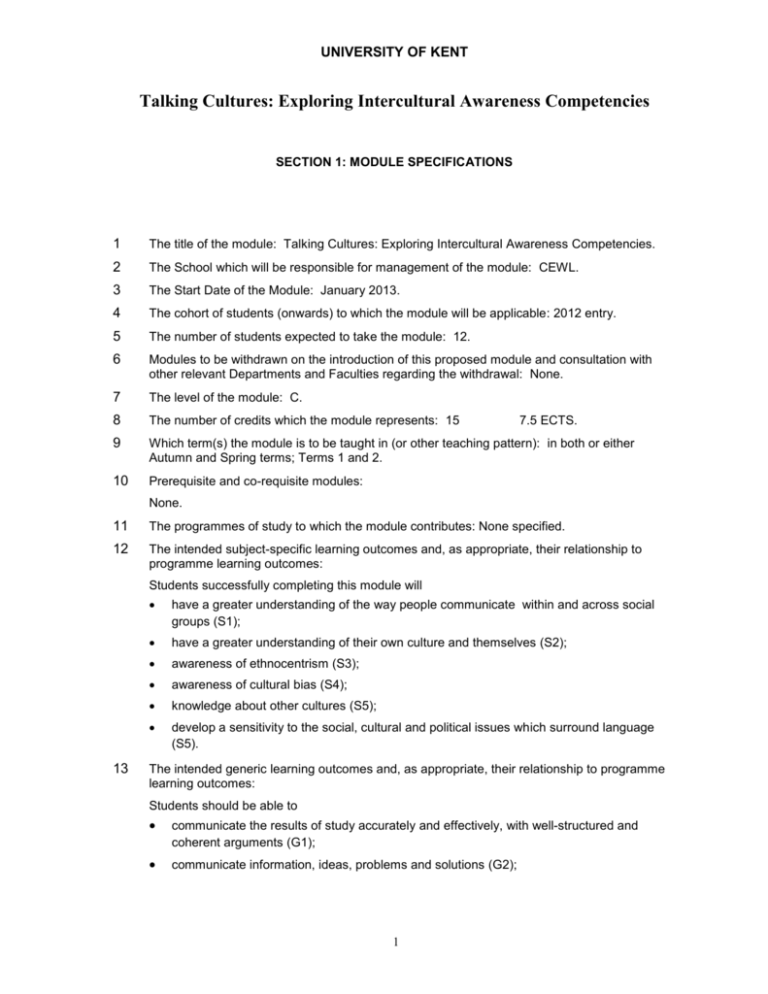
UNIVERSITY OF KENT Talking Cultures: Exploring Intercultural Awareness Competencies SECTION 1: MODULE SPECIFICATIONS 1 The title of the module: Talking Cultures: Exploring Intercultural Awareness Competencies. 2 The School which will be responsible for management of the module: CEWL. 3 The Start Date of the Module: January 2013. 4 The cohort of students (onwards) to which the module will be applicable: 2012 entry. 5 The number of students expected to take the module: 12. 6 Modules to be withdrawn on the introduction of this proposed module and consultation with other relevant Departments and Faculties regarding the withdrawal: None. 7 The level of the module: C. 8 The number of credits which the module represents: 15 9 Which term(s) the module is to be taught in (or other teaching pattern): in both or either Autumn and Spring terms; Terms 1 and 2. 10 Prerequisite and co-requisite modules: 7.5 ECTS. None. 11 The programmes of study to which the module contributes: None specified. 12 The intended subject-specific learning outcomes and, as appropriate, their relationship to programme learning outcomes: Students successfully completing this module will 13 have a greater understanding of the way people communicate within and across social groups (S1); have a greater understanding of their own culture and themselves (S2); awareness of ethnocentrism (S3); awareness of cultural bias (S4); knowledge about other cultures (S5); develop a sensitivity to the social, cultural and political issues which surround language (S5). The intended generic learning outcomes and, as appropriate, their relationship to programme learning outcomes: Students should be able to communicate the results of study accurately and effectively, with well-structured and coherent arguments (G1); communicate information, ideas, problems and solutions (G2); 1 UNIVERSITY OF KENT 14 select and use appropriate library and information technology application and resources (G3); synthesise information by presenting their own interpretation (G5); evaluate information obtained from discussions with others (G6); work cooperatively with others in a seminar/workshop format (G7); take a leading role in group discussions (G8); make clear and relevant contributions to discussions (G9); respond perceptively to contributions from others (G10); manage own learning effectively and responsibly to achieve goals and meet deadlines (G11); undertake independent learning (G12). A synopsis of the curriculum: The module which tackles the notion of intercultural communication, aims to develop students' engagement and integration with their fellow classmates within a contemporary internationalised classroom. The module will help to increase awareness of cultural differences and will explore cultural heritage, prejudices and stereotypes. . All the following thematic areas will be covered throughout the workshops but not necessarily in the order they are presented below: Awareness of ethnocentrism Cultural bias Cultural Knowledge (about other cultures, people, nations, behaviours ...) with emphasis on ways to compare and contrast cultures and identify fundamental differences between cultures Empathy Cultural identity Othering (the process of ascribing identity to the Self through the often negative attribution of characteristics to the Other) Politeness, respect and power Identification of problems that can occur during spoken discourse and social interaction. Students will actively participate in independent and collaborative work in the form of leading and engaging in seminar discussions, giving presentations, writing summaries , an essay and a report. It is anticipated that through the range of workshops, students will develop their communication skills to engage effectively while in discussion, persuasion, influencing, argumentation and negotiation both in written and in oral form, individually and as part of a team. In addition, students will be expected to read widely on related topics to underpin their credibility as both opinion leaders and as serious academic researchers. 2 UNIVERSITY OF KENT 15 Indicative Reading List: Holliday, Adrian, Martin Hyde & John Kullman (2010) Intercultural Communication: an advanced resource book for students London: Routledge. Kotthoff, Helga & Helen Spencer-Oatey eds. (2007) Handbook of Intercultural Communication Berlin: Walter de Gruyter. Martin, J.N. & T.K. Nakayama (2008) Experiencing Intercultural Communication: an introduction New York: McGraw Hill. Neuliep, J.W. (2011) Intercultural Communication: a contextual approach 5th ed. London: Sage. Novinger, Tracy (2001) Intercultural Communication: A Practical Guide Austin, Texas: University of Texas Press. Pan, Y., S. Wong Scollon & R. Scollon (2002) Professional Communication in International Settings Oxford: Blackwell. Scollon, Ron, Suzanne Wong Scollon & Rodney H. Jones (2012) Intercultural Communication: A Discourse Approach Chichester: John Wiley. Spencer-Oatey, Helen (2008) Culturally Speaking: culture communication and politeness theory London: Continuum. Spencer-Oatey & P. Franklin (2009) Intercultural Interaction: a multidisciplinary approach to intercultural communication Basingstoke: Palgrave Macmillan. 16 Learning and Teaching Methods, including the nature and number of contact hours and the total study hours which will be expected of students, and how these relate to achievement of the intended learning outcomes: As the learning outcomes of this 15 credit module focus on intercultural awareness, students will be expected to attend 2 hours of workshop sessions per week. They will also be expected to complete a minimum of 10.5 hours per week guided self-study; a total of 150 hours. Contact time during workshop sessions will be used to introduce topics and provide opportunities for practice, discussion and feedback. During the workshops, students will: engage in analysis and discussion of texts, and of effective oral, written and academic communication analyse and practise debating skills and strategies of argumentation engage in seminar discussions lead seminar discussions present opinions give persuasive opinions and presentations have a forum for discussing study and research skills and putting these into practice Students will be given guided self-study tasks to further develop the skills and concepts introduced in workshop sessions. These tasks are also intended to encourage students to develop independent study skills. 3 UNIVERSITY OF KENT 17 Assessment methods and how these relate to testing achievement of the intended learning outcomes: Learning outcomes will be assessed by 100% course work. The following is indicative of the assessment pattern: 18 Weeks 8/ 20 Essay (1500 words) 40% Weeks 12/24 Group project presentation 30% Submit in Weeks 12/ 24 Learner Journal (1500 words) 30% Implications for learning resources, including staff, library, and IT space: Purchase of books for the library. No particular IT resources are required. Staff and space costs will be covered by FTEs generated by the module. 19 The School recognises and has embedded the expectations of current disability equality legislation, and supports students with a declared disability or special educational need in its teaching. Within this module we will make reasonable adjustments wherever necessary, including additional or substitute materials, teaching modes or assessment methods for students who have declared and discussed their learning support needs. Arrangements for students with declared disabilities will be made on an individual basis, in consultation with the University’s/Collaborative Partner’s (delete as applicable) disability/dyslexia support service, and specialist support will be provided where needed. 20 Campus where module will be delivered: Canterbury SECTION 2: MODULE IS PART OF A PROGRAMME OF STUDY IN A UNIVERSITY DEPARTMENT Statement by the Director of Learning and Teaching: "I confirm I have been consulted on the above module proposal and have given advice on the correct procedures and required content of module proposals" ................................................................ Director of Learning and Teaching .............................................. Date ………………………………………………… Print Name Statement by the Head of Department: "I confirm that the Department has approved the introduction of the module and, where the module is proposed by Departmental staff, will be responsible for its resourcing" ................................................................. Head of Department .............................................. Date ……………………………………………………. Print Name 4




